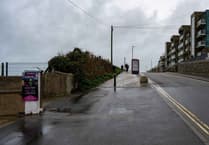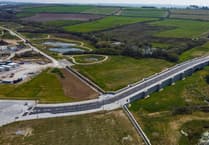Cornwall Council’s strategy on how to encourage electric vehicle (EV) uptake through the creation of a comprehensive network of charge-points across the Duchy has been approved, but not without major concerns being raised.
Councillors said the county faced a “massive challenge” in installing the number of charge-points needed by 2030, particularly due to Cornwall’s rurality.
Concerns were also raised about a divide between those who can and cannot afford electric vehicles, and the impact on parking if charging is increased in public car parks.
There was also a suggestion that tourism and visitors to Cornwall should shoulder much of the financial cost of installing the necessary infrastructure needed to make the Duchy more EV friendly.
The council’s strategy proposes six overarching actions:
• Expand the network of public EV charge-points
• Support residents without access to off-street parking
• Support rural areas to have access to EV charging
• Support tourists and visitors to be able to charge
• Raise awareness and grow confidence in EVs
• Accelerate the uptake of EVs in areas the council can directly influence
The strategy is currently unfunded, though £5.5-million of government money has been earmarked for EV proposals by Cornwall Council, but it won’t be anywhere near enough to deliver the whole strategy, which is expected to be in the hundreds of millions and largely paid for by private companies.
Currently, 2.4 per cent of vehicles registered in Cornwall are electric. There are 458 publicly available charge-points in Cornwall, ranking Cornwall better than the UK average for number of charge-points per 100,000 people.
It is expected that EV uptake in Cornwall will rise to eight per cent in 2025, 27 per cent in 2030 and 58 per cent in 2035. It is forecast that the public sector will need to provide between 1,500 and 2,200 fast and 90 to 120 rapid publicly accessible charge-points by 2030 if it is to fill the gaps left by the private sector. The council also aims to carbonise its fleet of vehicles by 2030.
A meeting of the council’s economic growth and scrutiny committee last week heard there was concern among the public about loss of parking for non-electric vehicles, as many of the public charging points are in car parks.
Rebecca Lyle, the authority’s transport strategy lead, said: “We are expected by government to be trialling different types of solutions, so we will be looking at on-street charging, it won’t just be focused on car parks.”
Just over 500 people responded to a public consultation about the council’s strategy, with the majority unsatisfied with current EV charge-point provision, but there was strong support for the aims and actions of the strategy overall.
The meeting heard that Cornwall lamp-post infrastructure cannot support EV charging unlike other parts of the country.
Delivering charging to rural areas will prove difficult and there will be constraints on where charge-points can be delivered in the short-term, due to grid capacity, cost and the environment.
Options for a revenue generating model resulted in some opposition from consultees who opposed the council “making money” out of it. The meeting heard that this would be for further debate.
Committee chairman Cllr Martin Worth called for Cornwall’s EV strategy to be linked with Celtic Sea Power’s plans to unlock the potential of floating offshore wind and how residents could benefit from it.
Cllr Tim Dwelly congratulated officers on the strategy, particularly in an area like Cornwall where “there isn’t always going to be a bus or a train”. However, he didn’t feel it went far enough.
“My worries are that there’s an EV divide in Cornwall between people like me who are lucky enough to charge my car at my house and people, particularly in towns, who can’t easily charge their vehicles, especially now the lamp-posts are excluded.
“The worry I have in 10 years’ time as more cars are electric, and people are buying and leasing second-hand electric vehicles, is that you might see better off people in bigger properties going that way leaving less well-off people who have cars with petrol and costs. If we’re not targeting people in terraced houses, we might be missing the carbon effect. Where people live in urban areas, there’s more carbon to be saved.
“If we don’t tackle electrical charging effectively in towns, we’ve got a problem because it might be fine for people here and there in better-off properties, but that’s not going to be very significant in carbon terms.”
He added: “I believe, in terms of revenue generation, we should be focusing on tourism and visitors paying the money to generate what we can do. We need to be making money from people who are temporarily here and who are probably better off.”
Cllr Dwelly suggested quantifying what Cornwall needs and what it costs, so it could be negotiated with the next government. “The cost of creating a proper infrastructure for EV in Cornwall is going to be presumably hundreds of millions of pounds and it might take many years to get there, but let’s say what it is.”
Cllr Leigh Frost was concerned about the effect on the electricity grid.
“Do we know how much added pressure this increased usage is going to put on the grid as we get to 58 per cent of vehicles in Cornwall being EV as set out in the strategy? What worries me is we do all these wonderful things and then it’s kind of like South West Water where they say everything’s fine and now we’re pumping a load of crap into the sea. I don’t want the same thing to happen electricity-wise.”
He was told that those issues, including Celtic Sea Power’s possible involvement, need to be flagged in the strategy going forward. Cllr Louis Gardner said conversations around National Grid capacity were already happening.
Cllr Peter Perry gave some figures “on the scale we are facing.”
He said, according to the DVLA, 20,800 vehicles in Cornwall were reported to be low emission vehicles a year ago. The aim by 2030 is that 27 per cent of the vehicles in Cornwall would be EV, meaning 113,400 vehicles.
“If only 30 per cent of them needed charging at any one time we would need 32,800 charge points. That’s an idea of what we could be facing. It is a massive challenge. I’m not belittling the work we’re doing, I hope I’m just drawing attention to some of the problems.”
He called for a change in planning policy so that every new home must have an EV charging point.
“That would reduce in a small way the demand for charging points in the countryside,” he said.
Officers pointed out that national building regulations ensure that every new home throughout the country now has to have a charging point.
The committee approved the strategy and unanimously voted in favour for an added recommendation by Cllr Dwelly to increase Cornwall Council’s prioritisation of convenient EV charging for residents particularly the less well-off and to quantify the investment needed to deliver an acceptable provision, and use that information for future negotiations with the next government to influence funding.





Comments
This article has no comments yet. Be the first to leave a comment.